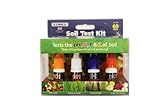Last updated on March 31st, 2022
Our site is reader supported, this means we may earn a small commission from Amazon and other affiliates when you buy through links on our site.
Sometimes your garden doesn’t grow the way you want and the plants you are growing begin to turn a slightly yellow shade. You might suspect the culprit is a nitrogen deficiency, but how do you rectify it?
The importance of nitrogen
Firstly, nitrogen is what plants use to grow. Nitrogen is used to make proteins, amino acids, and generate DNA. Without nitrogen in the soil, your plants cannot make cells and grow. Nitrogen is everywhere; in fact, it makes up 78% of the air that we breathe. But for plants, they need to absorb the nitrogen through the soil.
How to spot the signs of nitrogen deficiency
The most significant signs of nitrogen deficiency include stunted growth and yellowing of the leaves. There is no way to test your soil for nitrogen without a soil test kit. Soil test kits are straightforward to use, you just follow the instructions by taking samples of your soil, and it will tell you what the levels of nitrogen are. You can find these tests kits online, at a local nursery or garden centre and at DIY stores.
- This kit tests for all the major nutrients in your soil such as N, P, K and pH.
- Enough for around 60 tests
- Essential kit for any gardener
How to add more nitrogen to the soil
Once you have tested your soil and the results show there is a deficiency of nitrogen, there are two routes you can take to rectify it. You can add nitrogen to your soil using an organic or a non-organic method.
Adding nitrogen to the soil organically
Add composted manure to the soil
To add more nitrogen using an organic method, you need a lot more time, but you will get an even distribution of nitrogen in your soil.
The first way to naturally add more nitrogen is to add composted manure to your soil. You will need to work this into the soil, so this process is usually easier to undertake before your plants start growing. Otherwise, it will be a lot more difficult to mix it evenly into the soil without disturbing the roots.
- Improves the vitality of roses, flowers, fruit and vegetables
- This benefit improves yields tremendously
Growing green manure
Similarly, you can plant a green manure crop around your seasonal plants to help add nitrogen back into the soil naturally. This is something that again you need to plan for and should be something you make a regular part of your crop rotation if you want to ensure efficient levels of nitrogen on a regular basis.
You can also plant nitrogen-fixing crops like beans or peas. These are things you can add to your regular crop rotation and don’t have to be something grown out of season, but something you can plant with your regular crops.
Using coffee grounds
Another way to naturally add nitrogen to your soil is to save all your coffee grounds and mix them into the soil. This might be slightly easier to do if you notice a nitrogen deficiency while your plants are in the middle of the growing season because you can easily sprinkle it around the plant into the top few centimetres of soil without disturbing roots.
Adding nitrogen to the soil using fertilisers
The non-organic way to more quickly add nitrogen to your soil is by way of chemical fertiliser. Chemical fertilisers are labelled according to the ratio they have of nitrogen, phosphorus, and potassium, in that order. This is what is called the NPK ratio and this ratio will tell you the amount of all three. The most basic fertiliser is 10-10-10, which means equal parts of all three. If you need to boost the nitrogen in your soil you can find one with a ratio that has a higher first figure, indicating a higher level of nitrogen compared to potassium and phosphorus.
- A fully soluble lower nitrogen plant food for mature growth.
- All Chempak Soluble Plant Foods contain seven essential trace elements, far more than ordinary soluble fertiliser.
- These trace elements are absolutely necessary to plant growth and serious disorders can occur if any are absent.
- They are fully soluble which means they start to work instantly.
- Chempak Formula 8 has a lower nitrogen content, but offers extra phosphate and potash, which matures growth and encourages a firm ripe finish to onions, leeks and other vegetables.
You have to remember that non-organic, chemical fertilisers will immediately give a big boost of nitrogen to the soil and this will go a long way towards rectifying problems you might be experiencing in your garden but, that solution will fade quickly.
To learn more about improving soil please read our guide here
To that end, it’s recommended that you do a combination of organic and non-organic solutions. The organic solutions for adding more nitrogen to your soil should be undertaken on a regular and annual basis. Still, if you need to add nitrogen quickly, the non-organic fertilisers will produce the fastest results.
Last update on 2025-06-20 / Affiliate links / Images from Amazon Product Advertising API


